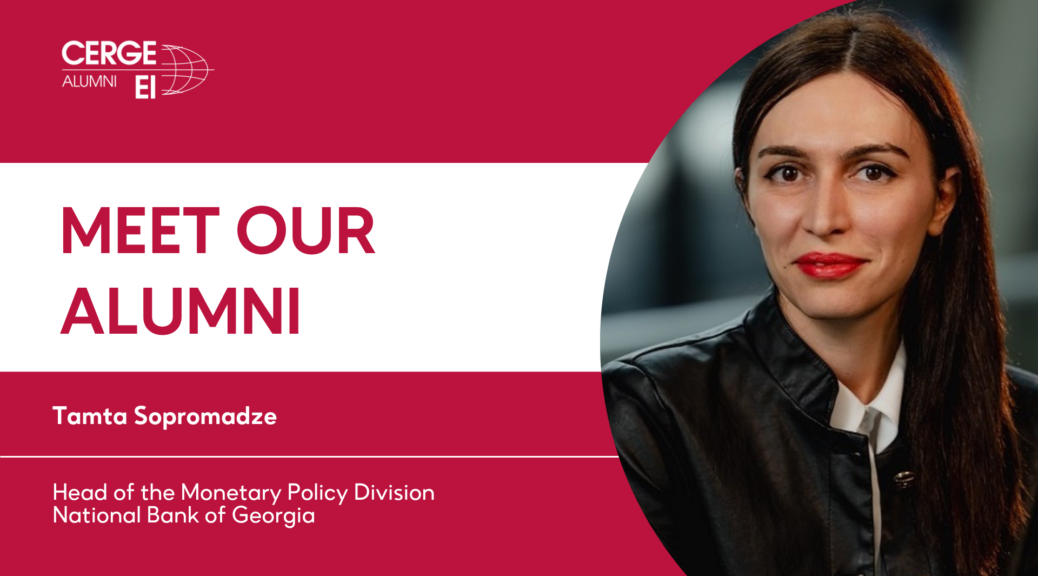After completing her studies at CERGE-EI, Tamta Sopromadze returned to her home country to contribute to Georgia’s economic stability through roles at the National Bank of Georgia. Read her insights into macroeconomic analysis and policy in the new alumni interview!
After completing your studies at CERGE-EI, you returned to Georgia to work initially at the Parliamentary Budget Office and later at the National Bank of Georgia. How have your experiences and education at CERGE-EI contributed to your career progression?
Throughout my career, I have specialized in macroeconomic analysis and modeling, benefiting from the knowledge and skills I acquired during my studies at CERGE-EI. These competencies have played an important role in my career progression.
CERGE-EI provided me with a strong foundation in complex economic analysis and technical skills, which are essential for my work. The emphasis on empirical research equipped me with the ability to conduct accurate macroeconomic assessments. The latter has been particularly valuable in my roles at both the Parliamentary Budget Office and the National Bank of Georgia.
In addition to the technical skills, CERGE-EI taught me how to work effectively under pressure and make informed decisions based on complex analysis. Those skills are essential in policy making, where rapid and effective decision making are crucial for maintaining economic stability.
Having worked at the National Bank of Georgia for over seven years, particularly in the Macroeconomic Research and Monetary Policy Divisions, could you highlight one or two key projects you have led? What impact did these projects have?
During my career at the National Bank of Georgia, one of the most significant projects I led entailed updating our macroeconomic models, incorporating non-linear linkages and Georgian economic characteristics like dollarization in them. Georgia is a small, open economy with a high level of dollarization that creates additional pressures on inflation as well as on economic growth. This update was crucial as the National Bank of Georgia operates under a flexible inflation targeting regime, where monetary policy decisions depend on the future economic outlook. In this framework, policymakers determine if they are adjusting monetary policy instruments aggressively enough to anchor inflation expectations and maintain price stability. The aim is to ensure that the expected monetary policy rate path keeps inflation at the pre-announced target level in the medium term, acknowledging that the full effects of these policies take time to materialize.
By updating our macroeconomic models and incorporating Georgian economic characteristics, we enhanced our ability to navigate through challenging economic periods. These improvements allowed us to better gauge the impact of our monetary policies and make more informed decisions, ultimately helping to stabilize the economy during volatile times.
Since taking over as head of the Monetary Policy Division in 2022, what challenges do you think are most pressing for Georgia’s monetary policy today?
The most pressing challenges for Georgia’s monetary policy stem from a series of global economic shocks. These challenges are not unique to Georgia; central banks worldwide have have been navigating complex trade-offs in an increasingly uncertain environment.
The COVID-19 pandemic and the subsequent Russian invasion of Ukraine have created significant inflationary pressures. For developing countries like Georgia, which have structural vulnerabilities such as financial dollarization and dominant currency pricing in foreign trade, these shocks have required nuanced and multifaceted policy responses.
Despite these difficulties, the National Bank of Georgia has managed to maintain price stability through timely and effective monetary policy adjustments. It’s notable that emerging economies, including Georgia, began tightening their monetary policies even before the central banks of advanced economies. This proactive approach has helped Georgia bring inflation well below its target since the beginning of 2023.
However, significant challenges remain. Global uncertainties, particularly geopolitical tensions, continue to pose upward inflationary risks. The recent shocks have highlighted the importance of reducing dollarization. Dollarization is a major challenge for Georgia because it limits the effectiveness of monetary policy, poses risks to financial stability, and increases the country’s risk premium, impeding credit rating improvements. Therefore, the National Bank of Georgia continuously monitors and addresses dollarization dynamics to ensure economic stability.
Looking back on your career so far, what would you consider to be your greatest professional achievement?
I believe that the greatest achievement is doing what you love and feeling passionate about . For me, working on my country’s economic policy and contributing to its economic well-being is the most rewarding part of my career.
My greatest professional achievement has been leading the Monetary Policy Division at the National Bank of Georgia during a period of significant economic turbulence. Being at the forefront of monetary policy making during such challenging times has been both a great honor and a significant challenge. We had to provide different policy scenarios and manage risks in a very uncertain world. Additionally, we needed to communicate our policy decisions effectively to the market and the public, as uncertainty created turbulence in economic agents’ decisions. This experience has demonstrated the importance of economic analysis, effective communication, and strategic policy making in navigating through economic challenges and ensuring sustainable growth.
What do you believe is the most significant message that CERGE-EI imparts to its students?
The importance of analytical thinking and empirical research. CERGE-EI emphasizes the need to approach economic problems with a critical and methodical mindset. This comprehensive approach prepares students to address complex economic challenges in a globalized world, making them well-equipped for careers in both academia and policy-making institutions.
Since October 2024, Tamta has been the Deputy Head of the Macroeconomics and Statistics Department at the National Bank of Georgia, and a Short-Term Consultant for the International Monetary Fund (IMF).

